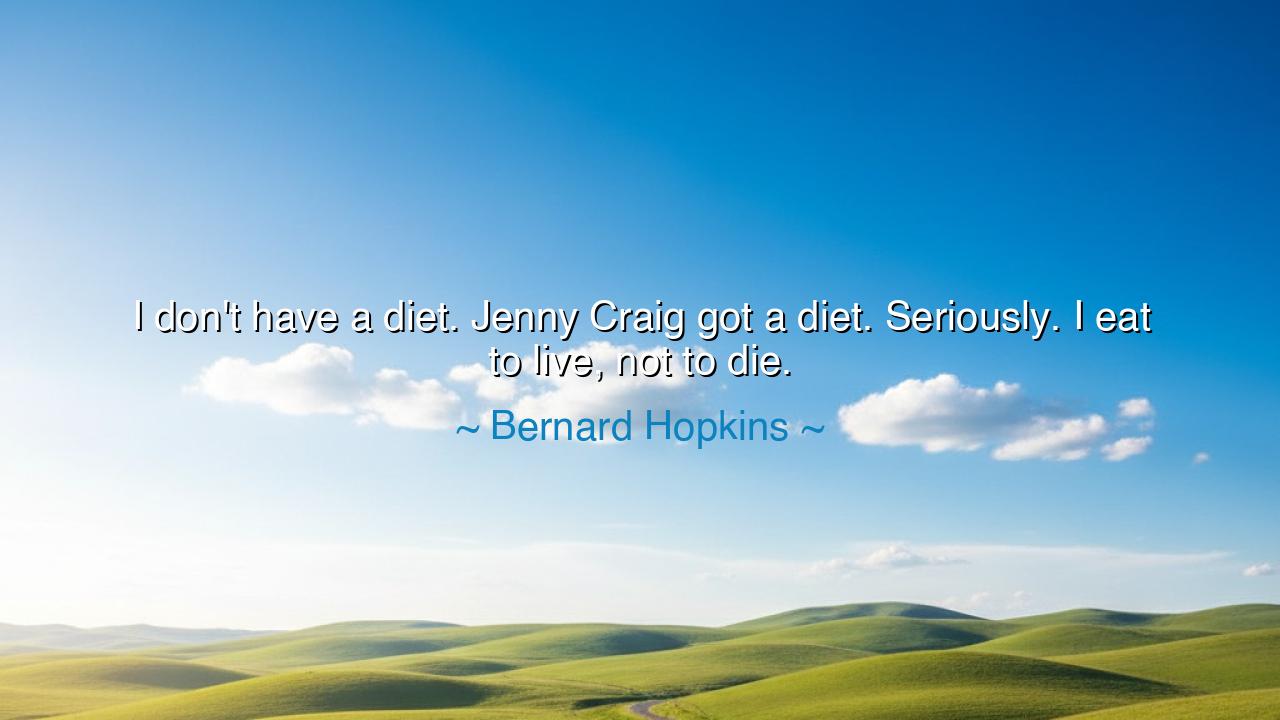
I don't have a diet. Jenny Craig got a diet. Seriously. I eat to






In the words of Bernard Hopkins, “I don’t have a diet. Jenny Craig got a diet. Seriously. I eat to live, not to die,” there resounds a warrior’s creed—a declaration born not from vanity, but from discipline, clarity, and the hard-earned wisdom of one who has faced both the ring and the world beyond it. His words are sharp and unpretentious, yet they cut deep, for they reveal a truth as old as the ages: that food is not pleasure alone, but power, not indulgence, but fuel. In this single sentence lies the philosophy of life itself—to live with purpose, to feed the body not for excess, but for endurance.
To say, “I eat to live, not to die,” is to return to the ancient order of things—to remember that eating was once an act of survival, sacred and deliberate. Before abundance dulled human instinct, the wise knew that every morsel was both medicine and sustenance. The gladiators of Rome, the soldiers of Sparta, the monks of the East—all understood that strength was not born from indulgence, but from intentional nourishment. Hopkins, a modern gladiator of the boxing ring, speaks with that same ancient discipline. He does not bow to the fleeting temptations of taste; he eats to sustain his purpose, to keep his body sharp and his will unbroken. His words remind us that the wise do not live to feed their desires—they feed their life’s mission.
In the ancient schools of philosophy, Socrates once said, “Thou shouldst eat to live; not live to eat.” Hopkins’s words echo this timeless wisdom. For the man who “has a diet” often seeks rules to restrain indulgence; but the man who “eats to live” needs no rules, for he has mastered himself. There is power in that distinction. Diets come and go like passing trends, but purpose endures. Hopkins rejects the artificial systems that promise salvation through restriction. He understands that the true diet is not found in books or brands—it is found in the alignment of mind, body, and will. The one who eats with awareness, who feeds life rather than appetite, has no need for doctrines, for he already walks the path of wisdom.
Consider the story of Milo of Croton, the ancient wrestler who built his strength by carrying a calf each day until it grew into a full-grown bull. He ate with intention—measured, precise, never in excess. His power came not from gluttony, but from discipline. Yet when his pride outgrew his wisdom, when he believed himself invincible and sought to tear a tree apart with his bare hands, he was caught within its trunk and perished. Thus, even in antiquity, the lesson was clear: strength sustained by purpose thrives; strength pursued by ego dies. Hopkins, through the simplicity of his creed, stands on the side of purpose. He is not driven by the hunger of the body, but by the hunger of destiny.
“Jenny Craig got a diet,” he says, with the humor of a man unmoved by modern fads. His jest is not mockery but liberation. It is a reminder that truth is often hidden beneath the noise of convenience. The ancients would have laughed with him—for in every age, merchants have sold illusions of easy virtue. But Hopkins’s path, like that of the Stoics, demands no gimmicks, no tricks, no fleeting systems. His is the old way—the way of discipline, simplicity, and purpose. He eats what sustains him, trains what strengthens him, and discards what weakens his resolve. In this, his body becomes not a prison of desire, but a vessel of endurance.
His words are also a rebuke to modern excess—a world where abundance has made people sick and convenience has dulled awareness. “I eat to live, not to die” is not merely a saying; it is a moral compass. It calls each of us to awaken from the sleep of habit and remember that what we consume, we become. The one who eats mindlessly feeds decay, but the one who eats with purpose feeds vitality. The ancient physicians, from Hippocrates to Avicenna, all knew this: that food, taken rightly, is medicine; but taken without thought, it is poison. Hopkins, through the language of a fighter, reminds us that the choice between life and death begins at the table.
Let this teaching endure for those who seek strength of body and clarity of spirit: Eat with purpose, live with intention, train with devotion. Do not live to chase flavor, but to preserve fire. Let every meal be an offering to life itself. The one who governs his appetite governs his fate, for appetite is the first test of the soul. Feed your body that your mind may serve; feed your mind that your spirit may rise.
Thus, the wisdom of Bernard Hopkins stands as a commandment for all who would live with power and awareness: Eat to live, not to die. Nourish your purpose, not your pleasure. For the body that is ruled by discipline becomes the ally of destiny, and the spirit that feeds on wisdom never perishes. In this balance between hunger and restraint lies not only health, but freedom—the freedom of one who has learned that the truest nourishment is not in food alone, but in the will to live with clarity, strength, and purpose.






AAdministratorAdministrator
Welcome, honored guests. Please leave a comment, we will respond soon